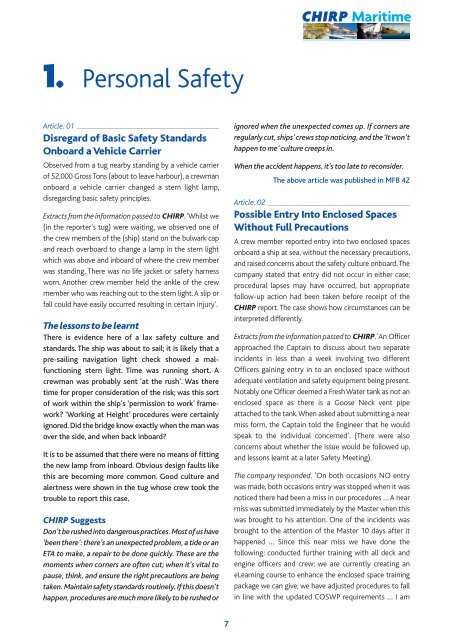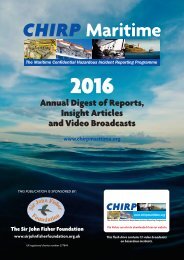CHIRP annual digest 2016 flip
You also want an ePaper? Increase the reach of your titles
YUMPU automatically turns print PDFs into web optimized ePapers that Google loves.
<strong>CHIRP</strong> Maritime<br />
1. Personal Safety<br />
Article. 01<br />
Disregard of Basic Safety Standards<br />
Onboard a Vehicle Carrier<br />
Observed from a tug nearby standing by a vehicle carrier<br />
of 52,000 Gross Tons (about to leave harbour), a crewman<br />
onboard a vehicle carrier changed a stern light lamp,<br />
disregarding basic safety principles.<br />
Extracts from the information passed to <strong>CHIRP</strong>. ‘Whilst we<br />
(in the reporter’s tug) were waiting, we observed one of<br />
the crew members of the (ship) stand on the bulwark cap<br />
and reach overboard to change a lamp in the stern light<br />
which was above and inboard of where the crew member<br />
was standing. There was no life jacket or safety harness<br />
worn. Another crew member held the ankle of the crew<br />
member who was reaching out to the stern light. A slip or<br />
fall could have easily occurred resulting in certain injury’.<br />
The lessons to be learnt<br />
There is evidence here of a lax safety culture and<br />
standards. The ship was about to sail; it is likely that a<br />
pre-sailing navigation light check showed a mal -<br />
functioning stern light. Time was running short. A<br />
crewman was probably sent ‘at the rush’. Was there<br />
time for proper consideration of the risk; was this sort<br />
of work within the ship’s ‘permission to work’ frame -<br />
work? ‘Working at Height’ procedures were certainly<br />
ignored. Did the bridge know exactly when the man was<br />
over the side, and when back inboard?<br />
It is to be assumed that there were no means of fitting<br />
the new lamp from inboard. Obvious design faults like<br />
this are becoming more common. Good culture and<br />
alertness were shown in the tug whose crew took the<br />
trouble to report this case.<br />
<strong>CHIRP</strong> Suggests<br />
Don’t be rushed into dangerous practices. Most of us have<br />
‘been there’: there’s an unexpected problem, a tide or an<br />
ETA to make, a repair to be done quickly. These are the<br />
moments when corners are often cut; when it’s vital to<br />
pause, think, and ensure the right precautions are being<br />
taken. Maintain safety standards routinely. If this doesn’t<br />
happen, procedures are much more likely to be rushed or<br />
ignored when the unexpected comes up. If corners are<br />
regularly cut, ships’ crews stop noticing, and the ‘It won’t<br />
happen to me’ culture creeps in.<br />
When the accident happens, it’s too late to reconsider.<br />
The above article was published in MFB 42<br />
Article. 02<br />
Possible Entry Into Enclosed Spaces<br />
Without Full Precautions<br />
A crew member reported entry into two enclosed spaces<br />
onboard a ship at sea, without the necessary precautions,<br />
and raised concerns about the safety culture onboard. The<br />
company stated that entry did not occur in either case;<br />
procedural lapses may have occurred, but appropriate<br />
follow-up action had been taken before receipt of the<br />
<strong>CHIRP</strong> report. The case shows how circumstances can be<br />
interpreted differently.<br />
Extracts from the information passed to <strong>CHIRP</strong>. ‘An Officer<br />
approached the Captain to discuss about two separate<br />
incidents in less than a week involving two different<br />
Officers gaining entry in to an enclosed space without<br />
adequate ventilation and safety equipment being present.<br />
Notably one Officer deemed a Fresh Water tank as not an<br />
enclosed space as there is a Goose Neck vent pipe<br />
attached to the tank. When asked about submitting a near<br />
miss form, the Captain told the Engineer that he would<br />
speak to the individual concerned’. (There were also<br />
concerns about whether the issue would be followed up,<br />
and lessons learnt at a later Safety Meeting).<br />
The company responded. ‘On both occasions NO entry<br />
was made, both occasions entry was stopped when it was<br />
noticed there had been a miss in our procedures … A near<br />
miss was submitted immediately by the Master when this<br />
was brought to his attention. One of the incidents was<br />
brought to the attention of the Master 10 days after it<br />
happened … Since this near miss we have done the<br />
following: conducted further training with all deck and<br />
engine officers and crew; we are currently creating an<br />
eLearning course to enhance the enclosed space training<br />
package we can give; we have adjusted procedures to fall<br />
in line with the updated COSWP requirements … I am<br />
7



